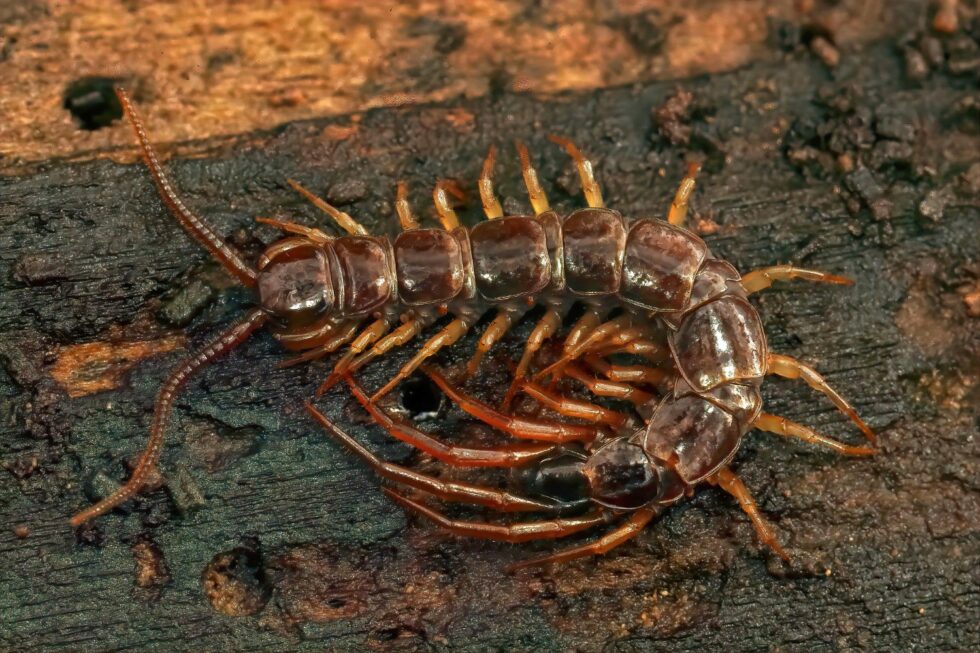Creepy, crawly bugs with multiple legs are never welcome in our homes, but are centipedes poisonous? While centipedes inject venom into their prey, most species’ venom isn’t potent enough to seriously harm humans. However, centipede bites can be painful and cause localized swelling, redness, and irritation. Some individuals may experience allergic reactions, similar to a bee sting.
Most household pets, like dogs and cats, are unaffected if they eat centipedes or get bitten by them. However, larger, more aggressive centipedes, such as the Texas redheaded centipede, may cause more intense reactions.
If you have a centipede infestation in your home or business, Vinx Pest Control can help.
What Does a Centipede Look Like?
Centipedes have a distinct appearance that makes them fairly easy to identify:
- Body color: Ranges from dark brown to yellow, often with stripes or other markings.
- Legs: 15 to 177 pairs, always an odd number.
- Antennae: Long and covered with dense hair, helping them sense their environment.
- Venomous Claws: Specialized front legs (maxillipeds) inject venom into prey.
- Mouth: Very small, with poor eyesight; they rely on touch and smell to hunt.
Common Centipede Species
- House Centipede: Long legs, moves quickly, and preys on spiders and insects.
- Texas Redheaded Centipede: Bright red head, black body, yellow legs; grows up to 8 inches.

Centipedes vs. Millipedes: What’s the Difference?
Centipedes and millipedes look alike, but they act very differently. Knowing how they behave can help you keep them out of your home.
Centipedes: Fast and Venomous
- Bites & Defense: Centipedes have venom in their front legs to catch prey, but their bite is usually harmless to humans.
- Where They Live: They like damp, dark places such as basements, under rocks, and in bathrooms.
Millipedes: Slow and Harmless
- Defense Mechanism: Millipedes do not bite but roll into a ball when scared. Some release a smelly fluid that may irritate skin.
- Where They Live: They prefer damp areas like soil, leaf piles, and mulch, where they help break down dead plants.
Are Centipedes Dangerous?
People often ask, “Are centipedes poisonous?” While they do inject venom into prey, most centipedes are not harmful to humans. A bite may cause mild pain, like a bee sting. Their presence indoors may mean you have too much moisture or other pests around. Learn more here.
Do Centipedes Bite?
Centipedes do not have teeth, but they do have venomous claws that they use to subdue prey. When centipedes “bite” humans, it appears more like a puncture wound than a traditional bite.
Symptoms of a Centipede Bite
- Here’s a list of some of the symptoms of a centipede bite:
- Itching
- Nausea
- Chills
- Fever
- Swollen lymph nodes
- Swelling at the puncture site
- Heart Palpitations
- Anxiety
- Numbness around the bite
- Headache
If you suspect an allergic reaction, seek medical attention immediately.
What Do Centipedes Eat?
Centipedes are carnivorous and do not consume wood or damage homes like termites. Instead, they hunt insects such as:
A centipede infestation may indicate a larger problem—an abundance of other pests in your home.
Where Do Centipedes Come From?
Centipedes thrive in moist environments and are commonly found:
- Outdoors: Under stones, in leaf piles, rotting logs, or loose bark.
- Indoors: In basements, crawl spaces, under sinks, and even in potted plants.
- Bathrooms: Near drains and other damp areas where insects gather.
How to Get Rid of House Centipedes
1. Minimize Moisture
- Reduce indoor humidity with a dehumidifier.
- Use bathroom fans to ventilate moisture-prone areas.
2. Seal Entry Points
- Close cracks and gaps in windows, doors, and foundations.
- Install door sweeps to prevent pests from sneaking in.
3. Declutter Your Home
- Remove piles of clothes, newspapers, and cardboard that provide hiding spots.
- Regularly vacuum and dust to eliminate small insects that centipedes feed on.
4. Use Insecticides
- For severe infestations, apply centipede-targeting insecticides carefully.
- Always follow label instructions and consider professional pest control services.
5. Contact the Professionals
If centipedes are becoming a recurring problem, professional pest control can provide long-term solutions. Vinx Pest Control offers expert extermination services to remove centipedes and other pests from your home or business.
Are Centipedes Dangerous to Humans?
While centipedes are venomous, their bites are usually not dangerous to humans. Most centipede bites cause only mild discomfort, though larger species can inflict more painful wounds. The Texas redheaded centipede and giant desert centipede have stronger venom, which may cause intense pain and localized swelling. However, fatalities from centipede bites are virtually unheard of, making it important to ask—are centipedes poisonous enough to be a real threat?
That said, if you have small children, elderly family members, or pets, it’s best to keep centipedes out of your home to avoid any unwanted bites. While the answer to “are centipedes poisonous” is yes, their venom is primarily effective against insects and small prey rather than humans. However, taking preventive measures to reduce centipede infestations can help ensure a safer home environment for your family and pets.
Conclusion: Are Centipedes Poisonous?
While centipedes are venomous, their bites are usually not dangerous to humans. Most centipede bites cause only mild discomfort, though larger species can inflict more painful wounds. By reducing moisture, sealing entry points, and eliminating their food sources, you can keep centipedes out of your home.
Need Professional Pest Control?
If you have questions like “Are centipedes poisonous?” Vinx Pest Control serves Dallas-Fort Worth, Charleston, and Greenville, SC. If centipedes or other pests are invading your space, let us help. Contact us today!



